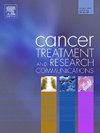Efficacy and safety of lorlatinib in patients with ALK- and ROS1-rearranged metastatic non-small cell lung cancer treated within the compassionate use program in Spain
Q3 Medicine
引用次数: 0
Abstract
Background
Lorlatinib, a third-generation tyrosine kinase inhibitor (TKI), targets both ALK and ROS1 rearrangements in non-small cell lung cancer (NSCLC). It is approved for ALK-positive patients after progression on prior TKIs but lacks FDA or EMA approval for ROS1-positive NSCLC. This study evaluates lorlatinib's efficacy and safety in both ALK- and ROS1-positive patients through a compassionate use program in Spain.
Methods
We analyzed ALK-positive patients treated from November 2016 to February 2019 and ROS1-positive patients treated from November 2016 to March 2021. Eligible patients had Stage IV NSCLC with confirmed ALK or ROS1 rearrangements and prior TKI therapy. For ALK-positive patients, at least two prior TKIs were required if crizotinib was used first. For ROS1-positive patients, prior crizotinib was required.
Results
In 61 ALK-positive patients, 59 % had brain metastasis, and 85.2 % received at least two prior ALK TKIs. The overall response rate (ORR) was 32.8 %, with a median progression-free survival (PFS) of 11.2 months. Intracranial ORR was 47.6 %, with higher efficacy in patients with evaluable brain metastasis. In patients with 1, 2, or ≥3 lines of previous TKIs, we observed a median PFS of 15.1, 11.1 and 7.6 months, respectively. Among 42 ROS1-positive patients, 59 % had brain metastasis, and 61.9 % received ≥2 prior therapies. The confirmed ORR was 47.6 %, with 16.7 % complete responses. Median PFS was 10 months. Patients receiving crizotinib alone had a median PFS of 10 months, while those with two prior TKIs had a median PFS of 8.5 months. Intracranial response was 44.4 %, rising to 57.1 % in patients evaluable with brain metastasis. No new safety signals were observed.
Conclusion
Lorlatinib demonstrated consistent efficacy and manageable safety in both ALK- and ROS1-positive NSCLC patients treated under the compassionate use program in Spain. These real-world findings support its use as an effective treatment option in heavily pretreated patients.
MicroAbstract
We evaluated the efficacy and safety of lorlatinib in ALK- and ROS1-positive NSCLC patients within a compassionate use program in Spain. Among 61 ALK-positive patients, including 59 % with brain metastasis and 85.2 % treated with at least 2 prior ALK TKIs, lorlatinib achieved a confirmed overall response rate (ORR) of 32.8 % and a median progression-free survival (PFS) of 11.2 months. In 42 ROS1-positive patients previously treated with crizotinib, lorlatinib showed an ORR of 47.6 % and a median PFS of 10 months, confirming its clinical activity despite the lack of FDA or EMA approval for this indication.
lorlatinib治疗ALK-和ros1重排转移性非小细胞肺癌的有效性和安全性
lorlatinib是第三代酪氨酸激酶抑制剂(TKI),在非小细胞肺癌(NSCLC)中靶向ALK和ROS1重排。它被批准用于先前TKIs进展后的alk阳性患者,但缺乏FDA或EMA批准用于ros1阳性NSCLC。本研究通过西班牙的同情使用项目评估lorlatinib在ALK-和ros1阳性患者中的疗效和安全性。方法分析2016年11月至2019年2月治疗的alk阳性患者和2016年11月至2021年3月治疗的ros1阳性患者。符合条件的患者为确认ALK或ROS1重排且既往接受TKI治疗的IV期NSCLC。对于alk阳性患者,如果首先使用克唑替尼,则至少需要两次tki。对于ros1阳性患者,需要事先使用克唑替尼。结果61例ALK阳性患者中,59%发生脑转移,85.2%既往至少接受过两次ALK TKIs。总缓解率(ORR)为32.8%,中位无进展生存期(PFS)为11.2个月。颅内ORR为47.6%,在可评估的脑转移患者中疗效更高。在既往tki为1、2或≥3行的患者中,我们观察到中位PFS分别为15.1、11.1和7.6个月。在42例ros1阳性患者中,59%发生脑转移,61.9%接受过≥2种既往治疗。确诊ORR为47.6%,完全缓解率为16.7%。中位PFS为10个月。单独接受克唑替尼治疗的患者的中位PFS为10个月,而先前接受过两次tki治疗的患者的中位PFS为8.5个月。颅内反应为44.4%,在可评估为脑转移的患者中上升至57.1%。没有观察到新的安全信号。结论lorlatinib对ALK-和ros1阳性的非小细胞肺癌患者具有一致的疗效和可管理的安全性。这些现实世界的研究结果支持它作为一种有效的治疗选择,用于大量预处理的患者。我们评估了lorlatinib在ALK-和ros1阳性的非小细胞肺癌患者中的疗效和安全性。在61名ALK阳性患者中,包括59%的脑转移患者和85.2%的至少接受过2次ALK TKIs治疗的患者,lorlatinib的确诊总缓解率(ORR)为32.8%,中位无进展生存期(PFS)为11.2个月。在42例先前接受过克唑替尼治疗的ros1阳性患者中,lorlatinib的ORR为47.6%,中位PFS为10个月,尽管缺乏FDA或EMA批准,但证实了其临床活性。
本文章由计算机程序翻译,如有差异,请以英文原文为准。
求助全文
约1分钟内获得全文
求助全文
来源期刊

Cancer treatment and research communications
Medicine-Oncology
CiteScore
4.30
自引率
0.00%
发文量
148
审稿时长
56 days
期刊介绍:
Cancer Treatment and Research Communications is an international peer-reviewed publication dedicated to providing comprehensive basic, translational, and clinical oncology research. The journal is devoted to articles on detection, diagnosis, prevention, policy, and treatment of cancer and provides a global forum for the nurturing and development of future generations of oncology scientists. Cancer Treatment and Research Communications publishes comprehensive reviews and original studies describing various aspects of basic through clinical research of all tumor types. The journal also accepts clinical studies in oncology, with an emphasis on prospective early phase clinical trials. Specific areas of interest include basic, translational, and clinical research and mechanistic approaches; cancer biology; molecular carcinogenesis; genetics and genomics; stem cell and developmental biology; immunology; molecular and cellular oncology; systems biology; drug sensitivity and resistance; gene and antisense therapy; pathology, markers, and prognostic indicators; chemoprevention strategies; multimodality therapy; cancer policy; and integration of various approaches. Our mission is to be the premier source of relevant information through promoting excellence in research and facilitating the timely translation of that science to health care and clinical practice.
 求助内容:
求助内容: 应助结果提醒方式:
应助结果提醒方式:


